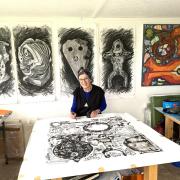As a lifelong AFC Bournemouth supporter, as well as an official club photographer, Sophie Cook was concerned that her transgender revelation could end the job she loved
“What can I do to make this easier for you?”
With that simple question Eddie Howe, AFC Bournemouth’s manager welcomed the real me back to the club that I’d loved my entire life.
Barely two months earlier I had stood on the pitch at Charlton Athletic capturing the historic moment as Dorset’s only football league club was crowned champions and promoted to the promised land of the Premier League. Players sprayed me with champagne, which incidentally is a lot less fun than it sounds, and I was at the centre of the celebrations as club photographer.
As I stood on the pitch, savouring the greatest day in the history of my football club, a club that a few short years previously had nearly gone out of business on a number of occasions, I was terrified.
This was, I believed, to be my last ever match with my beloved Cherries because I knew that what I was about to reveal could end my career in football.
I’ve known that I was transgender since I was seven. Unfortunately this was the mid 1970s and we had no internet, no LGBT (lesbian, gay, bisexual, and transgender) role models and certainly no out and proud transgender people for me to reference to make sense of what was happening to me.
The seven-year-old girl inside me was lost, lonely and afraid, and with no one to explain her existence to me I was driven at the age of 12 to attempt to take my own life for the first of many times.
My youngest daughter is now around this age and to think that she could be in this sort of pain breaks my heart.
I originally attempted to transition in 2000, I’d started the process but the bigotry and abuse that I suffered and the birth of my disabled son prompted me to kill Sophie and bury her for the next 15 years. This was a dark period during which I contemplated suicide every single day and which only ended with my decision to be true to myself in January 2015.
Standing on the Dean Court training pitch waiting to be introduced to the team, players that I knew so well but who had no idea who I was, I felt calm and sure in my own identity. Finally at ease with who I was.
“You’ve probably noticed that our photographer’s changed a bit since last season,” assistant manager Jason Tindall told the squad. “I’d like you all to meet Sophie.”
And at that captain Tommy Elphick started clapping, followed by the rest of the players. Despite my fears I was welcomed back to football and to the Cherries as my true self, the first transgender woman to work in the Premier League.
I’m now the person that I was always meant to be, the road to find me was long and painful, with great loss along the way.
Authentic in everything I now do, confident and proud, I don’t subscribe to shame or regret.
To those that ask me if I wish I’d transitioned in 2000 and avoided those 15 years of pain I point to my 13-year-old daughter, who I wouldn’t have if I’d done that. I was terrified that I’d lose her when I came out but she summed up the value of being authentic in one heartfelt sentence.
“You’re my hero, Steve was great but Sophie’s better.”
About Sophie
Ex-RAF engineer, motorbike racer, newspaper editor, football and rock photographer, Sophie Cook was the first transgender newscaster on European terrestrial TV for Brighton’s Latest TV and is now the head of Latest LGBT+ TV (thelatest.co.uk), the UK’s first terrestrial LGBT TV channel. The first trans woman to work in the Premier League as club photographer for AFC Bournemouth, Sophie is an ambassador for Kick It Out and patron of Just A Ball Game? She regularly speaks at conferences about LGBT issues and inclusion and diversity in the workplace. Find out more at sophiecook.me.uk.



























